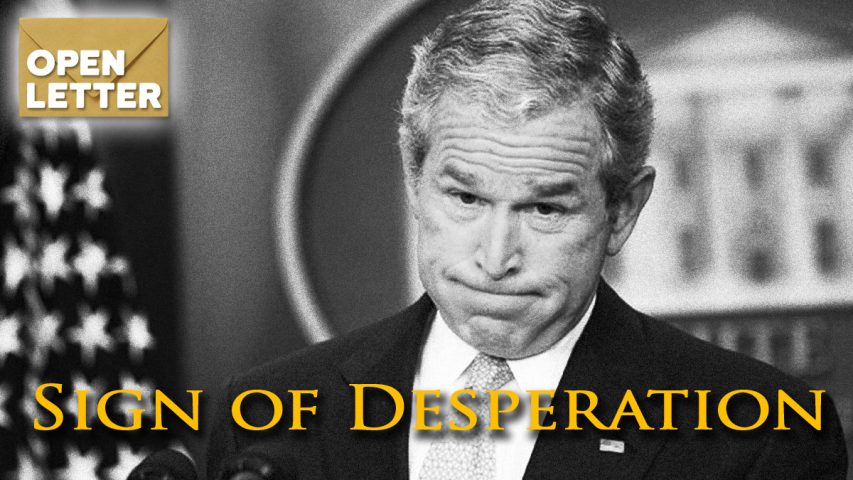Open Letter by Matthias Rath, M.D. to US-President George Bush and to the People of the World!
“As the physician and scientist who was privileged to contribute discoveries that make the eradication of cardiovascular disease by natural means possible and save millions of lives, I am asking you: could it be that this war is not about fighting ‘terrorism’ or conquering oil fields but about protecting the largest investment industry – the pharmaceutical industry – from collapse?”

Dr. Matthias Rath is the physician and scientist who led the breakthrough in the natural control of cardiovascular disease and cancer. He is member of the New York Academy of Sciences and other renowned scientific organizations. 10 years ago, the late Dr. Linus Pauling, recipient of the Nobel Prize in Chemistry and Peace stated: “Your discoveries are so important for millions of people that they threaten entire industries. One day there may even be wars just to prevent this breakthrough from being widely accepted. This is the time, when you need to stand up!” – This time is now.-
Millions of people worldwide are waking up to the fact that the pharmaceutical industry is an investment industry based on the continuation of diseases.
The survival of the pharmaceutical investment industry is threatened by four main factors:
- Unsolvable business conflicts
The nature of the pharmaceutical investment industry is the ‘business with disease’. Its basis is the patentability of new synthetic drugs that merely target symptoms but do not eliminate the root cause of diseases. The continued existence of diseases and their expansion is a precondition for further growth of this industry. Prevention and eradication of diseases undermines the economic basis of this business. - Unsolvable legal conflicts
A wave of patient litigation against the deadly side effects of pharmaceutical drugs threatens to cripple this industry. An end to this litigation is not in sight, since drug side effects are the fourth leading cause of death in the industrialized world (Journal of the American Medical Association, April 15, 1998). Side effects of pharmaceutical drugs kill more Americans every year than WWII and the Vietnam War combined. - Unsolvable ethical conflicts
The pharmaceutical industry faces an intrinsic conflict between maintaining profits from patent fees and meeting the health needs of people. In the developing countries, the profitability of drugs has been a major factor contributing to the spread of AIDS and other epidemics. - Unsolvable scientific conflicts
Advances in vitamin research, cellular medicine and natural health allow the control of today’s most common diseases. These safe, effective and affordable natural therapies focus on the prevention and eradication of diseases – not only the alleviation of symptoms. This fact and the low profitability of these non-patentable natural approaches, threaten the economic base of the pharmaceutical investment business.
While many events led up to the current crisis, none was as threatening to the survival of the entire pharmaceutical industry as the scandal around Bayer’s cholesterol lowering drug Baycol.
In August 2001 Bayer had to withdraw its leading new drug Baycol because more than 50 people had already died from taking it and more than 6 million patients were at risk from the deadly side effects of rhabdomyolysis (dissolving of muscle tissue). British pharmaceutical multinational Smith Kline Beecham (SKB) was Bayer’s global marketing partner.
Bayer – a century old flagship of the pharmaceutical industry – and British SKB – the world’s second largest drug maker – were faced with crippling lawsuits and other devastating economic consequences:
- Over 7,000 Patients taking Baycol from around the world have filed individual and class action lawsuits against these drug companies.
- Government authorities filed criminal lawsuits against the executives of these pharmaceutical companies for gross negligence. These executives knew about the deadly side effects while continuing to press for higher dosages.
- Investors lost billions of dollars in share value, threatening the very survival of these companies.
The Baycol scandal was only the beginning of a ‘domino effect’. Within weeks many multinational drug companies were faced with lawsuits from patients suffering severe side effects from taking other pharmaceutical drugs (beta blockers, calcium antagonists, estrogen replacement, etc).

September 11, 2001 2,600 innocent people died in this tragedy. The same number of people die from side effects of prescription drugs every ten days (Source: JAMA, April 15, 1998).
In summary, the pharmaceutical industry was facing the same grim fate as the tobacco industry, with entire States and Nations suing these companies for billions in damages. In August 2001, the end of the pharmaceutical industry seemed closer than ever.
But then everything stopped on September 11, 2001. On this day global attention shifted away from the crisis facing this industry.
Since then, the main goal of the Bush administrations has become to secure the survival of the pharmaceutical industry through:
- Attempts to overcome the unsolvable scientific conflicts.
The Bush administration is spearheading an international effort by the pharmaceutical industry to outlaw natural health therapies world-wide by abusing the United Nations ‘Codex Alimentarius’ (food standards) commission. - Attempts to overcome the unsolvable ethical conflicts.
The recent ‘relief’ program for fighting AIDS in developing countries is a 15 billion Dollar subsidy program for drug makers. While neglecting effective natural therapies to fight immune deficiencies this plan maintains the economic dependency on drug companies. - Attempts to overcome the unsolvable legal conflicts.
A key provision of the ‘Homeland Security Act’ grants immunity to the pharmaceutical companies for present and future product liability claims for vaccines. Further plans for ‘medical litigation reform’ include limiting product liability lawsuits against drug companies. - Attempts to overcome the unsolvable business conflict.
This conflict cannot be solved because it would destroy the very nature of the pharmaceutical “business with disease”. The only option for this industry’s survival are protectionist laws that artificially maintain control of the pharmaceutical investment business and its global health monopoly.
The war against Iraq is not primarily about fighting ‘terrorism’ or conquering oil fields. It is part of a long-term strategy of the pharmaceutical/petrochemical investment groups to create the psychological state of fear to maintain global control.
Long term international conflicts, wars – even the use of weapons of mass destruction – can be used to achieve this goal and suppress any opposition.
This war is not a sign of strength – but of desperation
LESSONS FROM HISTORY
70 years ago, this week, an event shocked the world and set the stage for the last World War. On February 28, 1933 the German parliament building, the Reichstag, was set on fire.
The official version that ‘terrorists’ had led the attack was soon questioned abroad. Today it is a fact that the Reichstagsbrand was deliberately used as a pretense and that the ‘empowerment laws’ following this event had been prepared in advance.
Following the burning of the Reichstag:
- civil rights were abolished,
- empowerment laws were enacted, including a “Homeland Security Act” (“Schutz von Heim und Reich”).
The Reichstag-Assault in 1933 provided the legal platform for 12 years of dictatorship and WWII. Its main benefactor was IG-Farben, the largest European petro-chemical Cartel seeking control of the oil and chemical industry worldwide.
In the Nuremberg War Tribunal in 1946/47 this Cartel was tried for ‘conquest’, ‘robbery’ and ‘slavery’ and – as a result – it was dismantled into Bayer, BASF and Hoechst.
This War Tribunal established that without these corporations, World War II would not have been possible. US-Chief Prosecutor Telford Taylor stated: “If their guilt is not brought to the daylight, they will do even more harm in future generations.”
Then and now millions of decent people are in danger of being mislead by their own governments. And those who do not learn the lessons from history are doomed to live through it again!”






